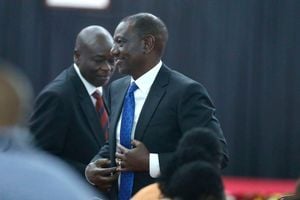Explainer: Can a President withdraw a Bill already passed by MPs? What experts say

President William Ruto.
President William Ruto’s withdrawal of the Finance Bill 2024 has sparked debate among legal minds on whether he has such powers to withdraw a Bill that has already been passed by Parliament.
The Bill had proposed to raise additional Sh302 billion on top of the Sh2.95 trillion in ordinary revenues and Appropriations in Aid (AiA) to finance the Sh3.9 trillion budget for the 2024/25 financial year.
It was passed by the National Assembly on Tuesday morning session but with amendments that scaled down the country’s additional revenue projections by Sh200 billion before proceeding on recess yesterday until July 23, 2024.
President Ruto sent his memorandum of referral to National Assembly Speaker Wetang’ula stating his reservations after he received the vellum yesterday.
What experts say
While the Constitution is explicit only on what happens to Bills transmitted to the President for assent, it is silent on the Bills that have been passed by the House but are yet to be transmitted for presidential assent.
As experts aver, the MPs will have to go through the entire Bill, including its name, to stand withdrawn as Dr Ruto is not an MP.
According to Senior Counsel Otiende Amollo (Rarieda MP), legislators' role once the Bill has been passed is functus officio and therefore cannot withdraw the Bill, neither can the president who is not an MP.
Functus officio refers to an officer or agency whose mandate has expired, due to either the arrival of an expiry date or an agency having accomplished the purpose for which it was created.
“The president has no powers to withdraw a Bill. It is very simple: he submits his reservations by officially writing to Speaker Moses Wetang’ula, or does nothing with the 14-day period and allow it to become law in 21 days,” said Mr Amollo, who was also a member of the Committee of Experts (CoE) on the 2010 Constitution.
He adds: After the Third Read, no MP has the power to withdraw the Bill. If the Bill comes into force after 21 days, the only options are repeal it or challenge it in court.”
Another expert, Constitutional lawyer Waikwa Wanyoike, says:
“If we wanted to constitutionally nuance this, the legal way is: Ruto registers reservations on all aspects od the Bill, including the title, sends it back to Bunge within 7 days, Bunge votes for and adopts every reservation is fully decimated,” he noted on his X handle.
Mr Gitobu Imanyara, the former Central Imenti MP who served in the National Assembly until 2013, said there were technicalities that Attorney-General Justin Muturi and the parliamentary legal counsel have to comply with.
‘Constitutional right’
“Once a Bill has gone to the President for assent he cannot withdraw it. He sends it back to Parliament for repeal on specific areas,” said Mr Imanyara.
Alternatively, he said, the President should sign it and simultaneously publish a Bill for its repeal. “Parliament will then pass the Bill for repeal. It's a legal quagmire.”
Senior Counsel Paul Muite said the President “has the constitutional right to decline to assent and to return it to the National Assembly with his amendment proposals.”
Makueni Governor Mutula Kilonzo Junior said the President’s refusal to assent to a Bill is part of the legislative process.
“He can return it and say he will not sign it and it should be withdrawn. This will move it to the floor of the House, where it will be withdrawn,” said Governor Kilonzo Junior.





